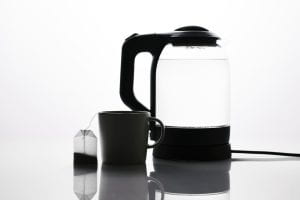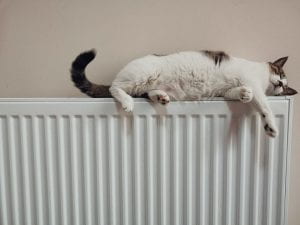Energy-saving tips for students 3

Avoid overfilling the kettle
Did you know that a simple household appliance like the kettle can consume more electricity each year than an electric oven, hob, or microwave? It may seem surprising, but it’s true.
We suggest filling the kettle with the exact amount of water you need. Overfilling your kettle could cost you between £11 and £19 a year.
Not only will you save money on your energy bill, but you’ll also prevent water wastage in the process. Most kettles are equipped with a scale on the side, indicating the appropriate water level based on the number of cups of tea or coffee you require.

Heating your home.
Simply turning your thermostat down by one degree will help you save a lot of money in the long run. However, this isn’t possible as winter can be cold and it’s important to look after your well-being as well as the planet and your wallet.
So, these three simple tips will make your heating work for you without compromising on that much-needed cosy winter.
- Set a timer on your thermostat for your heating to come on only when you need it.
- Close your blinds or curtains in the evening. This straightforward action can prevent heat loss by an impressive 17%. However, it’s crucial to ensure that your curtains don’t obstruct the radiators. By implementing this practice, you can enhance the energy efficiency of your living environment and maintain a cosy atmosphere while conserving heat.
- Avoid heating empty rooms by utilising individual radiator valves. If you have unused rooms, you can reduce or even turn off the radiators in those areas. By doing so, you can potentially reduce your gas usage by 4.5%—translating to savings of up to £55 per year for the average UK household. Additionally, remember to keep doors between adjoining rooms closed to prevent heat from escaping.
These simple measures will help you optimise energy consumption, minimise heating costs, and maintain a comfortably warm environment in the rooms you actively use.

Use LED lamps instead of overhead lights.
One simple step you can take is to switch from traditional light bulbs to energy-efficient LED lights. By using LEDs, you’ll be conserving energy and reducing greenhouse gas emissions, which directly contribute to climate change.
A bright ceiling light in a large room can consume around 10W, costing about 56p to run for eight hours a day. You could go for a bedside lamp with a 5W LED bulb instead, and you’ll only spend around 28p for the same period. Remember, it’s not just the light fixture but the bulb itself that determines energy usage. You could invest in a few LED lamps and place them strategically around your house.
LED lights come in various styles, colours, and brightness levels. Whether you need task lighting for studying or decorative lighting for your dorm room, LED lights will likely create the vibe you need.
Neither traditional light bulbs nor LED’s need to be kept on all the time; get in the habit of turning lights off when you leave the room.
At first, it may be surprising how often lights are left on in a house when no one is using them. Eventually, your actions may rub off onto others, and they may adopt your new energy-saving habits but don’t be discouraged if they don’t right away. It may take some of your friends until they have left university to realise how much cheaper it is to live sustainably! If you’re lucky, they may even thank you years later for helping them adopt positive habits at uni.
That’s it for this week. If you’ve got a technique or a story to share about saving energy/money, comment or email us at sustainability@marjon.ac.uk. #saveplanetsaveenergy
Follow us on Instagram and on Twitter
Post authored by:
Oscar Lindsey-Turner
Sustainability Ambassador
Plymouth Marjon University
